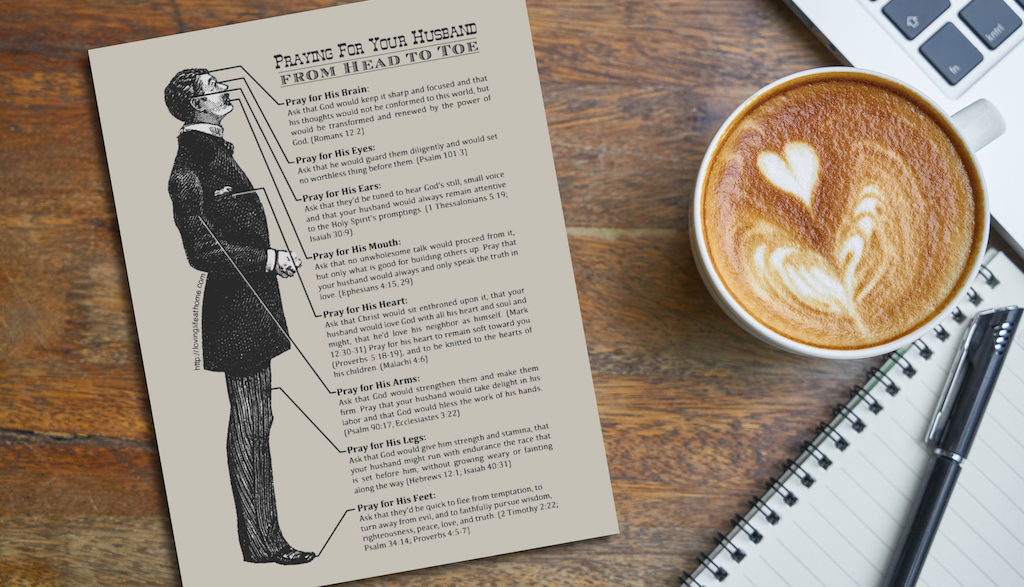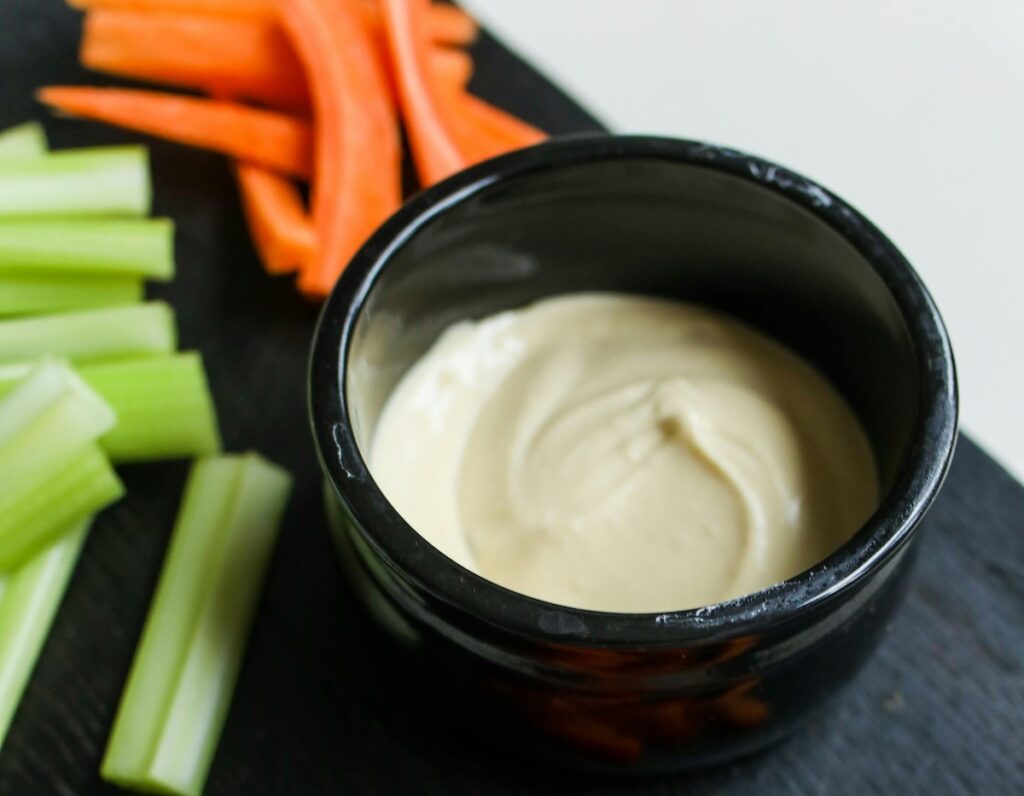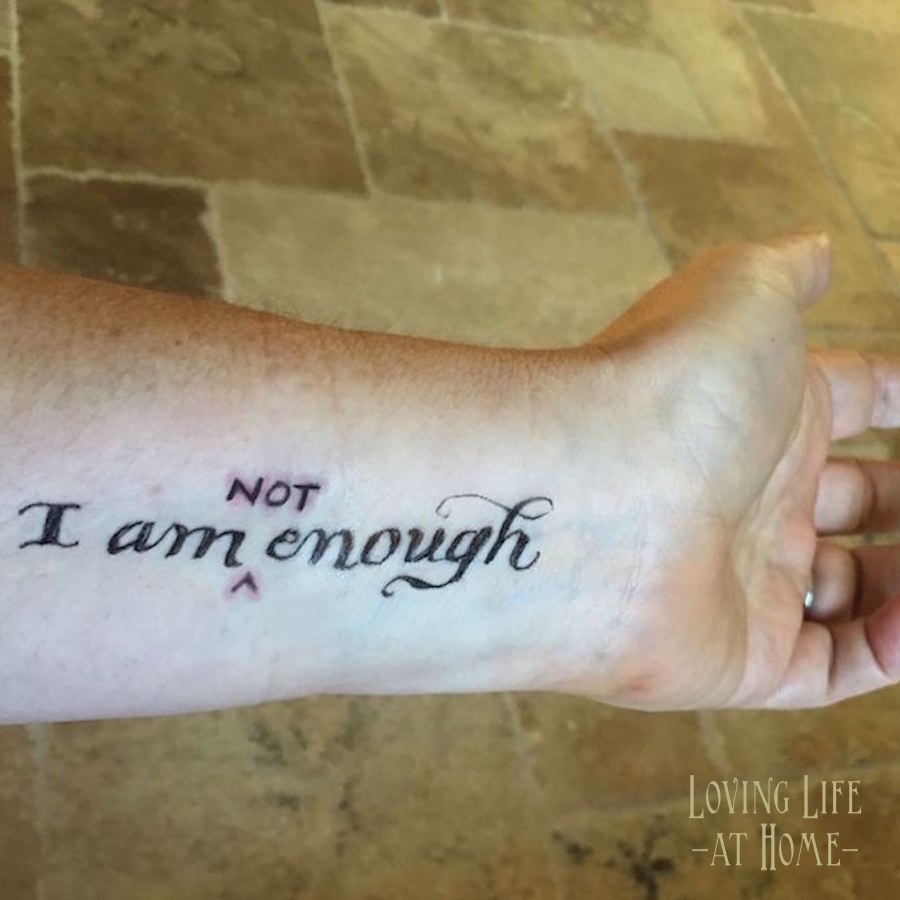EP 52: Helping Your Husband Make Better Food Choices

I received a message from a listener this week who was concerned about her husband’s health. His diet needs work, he does’t get enough sleep or enough exercise, and lately he’s been experiencing recurrent chest pain. She wondered if I could give her some ideas for helping her husband make better food choices. “How can I motivate him to improve his diet?”
So, today on the Loving Life at Home podcast, I’m sharing four tips for dealing with a spouse’s poor diet and exercise habits. I hope you’ll find them helpful, as well. Scroll past the show notes to read the transcript from this week’s episode in full.
Show Notes
VERSES CITED:
- “Be anxious for nothing, but in everything by prayer and supplication with thanksgiving let your requests be made known to God.” – Philippians 4:6
- “Which of you by worrying can add a single day to his life’s span?” Matthew 6:27
- “To the woman He said, ‘I will greatly multiply Your pain in childbirth, In pain you shall deliver children; Yet your desire will be for your husband, And he shall rule over you.’” – Genesis 3:16
- “If you do well, will your face not be cheerful? And if you do not do well, sin is lurking at the door; and its desire is for you, but you must master it.” – Genesis 4:7
RELATED SOURCES:
- Head-to-Toe Prayer Guide
- 31 Verses to Pray over Your Husband
- How Not to Die by Michael Greger, MD
- How Not to Age by Michael Greger, MD
- Get Up & Go by Jennifer Flanders
- Eat This, Not That by David Zinczenko
STAY CONNECTED:
- Subscribe: Flanders Family Freebies -(weekly themed link lists of free resources)
- Instagram: follow @flanders_family for more great content
- Family Blog: Flanders Family Home Life (parenting tips, homeschool help, free printables)
- Marriage Blog: Loving Life at Home (encouragement in your roles as wife, mother, believer)

Helping Hubby Make Better Choices
Podcast Transcript: Episode 52
Hello, friend. Welcome to Loving Life at Home. This is Episode 52, which means I’ve been podcasting for exactly a year now. Can you believe it?
Thank you so much for being here. I deeply appreciate your tuning in to listen as often as you can.
When I first started this podcast, I wondered if perhaps by the one-year mark, I would’ve exhausted everything I had to say. But thanks to all the great questions I’ve been getting from listeners recently along with wonderful suggestions for specific topics they’d like to hear addressed, I’m not even close to being finished with the editorial calendar I’ve created to keep track of them all.
Instead, I’m going to keep chipping away at all those letters and requests, starting with one I received just yesterday.
A friend of mine has been struggling with anxiety lately and messaged me to ask for some advice. She wrote:
“Hi, Jennifer. I’m finding myself battling with some worries on a regular basis…. I see [my husband] making bad food choices and leading a sedentary lifestyle, and he has been complaining of chest pain for over a month.
He’s a darling husband and father, and I love him so much, [but I am] fearful for his health. I can’t seem to motivate him to eat healthy or to [get adequate sleep and] exercise.
How can I best help him to be a good steward of his body?
Concerned Wife
Now, isn’t that a great question? It literally could have been written by just about every wife I know – including myself – at some point or other in her life.
In fact, my husband, Doug, and I had a lively discussion about the same topic less than 24 hours before this listener’s message came in.
That’s because my husband has been reading a book, which I’ll tell you about in a minute, that prompted him to adopt some new dietary changes. And he had previously asked for my help in implementing them.
But we’ve been traveling the past few days, and it’s always a bit of a challenge to make good food choices on the road. Have you ever noticed that? So, to help him out, in every restaurant we’ve dined at, on every given menu, I’ve been pointing out to Doug the food options that most closely aligned with his stated dietary goals.
And let’s just say, he did not at all appreciate my efforts to help out in this way!
So when this friend’s message came in the following day, I asked him over breakfast, “What would you advise a wife to do who is concerned about wha her husband has been eating and wants to know how to motivate him to make healthier choices? I’m asking FOR A FRIEND.”
Well, he didn’t have any suggestions to offer, but when I discussed with him the few tips I’m about to share with you, he agreed they were very good and said he would approve of them all.
Which is good for me to know, and hopefully will help you out, as well.

4 Tips for Improving Your Spouse’s Diet
1. Pray about it.
Philippians 4:6 tells us, “Be anxious for nothing, but in everything by prayer and supplication with thanksgiving let your requests be made known to God.”

Notice that there’s no caveat. The Bible doesn’t say, “Be anxious for nothing, UNLESS your husband makes poor dietary choices or refuses to exercise or has recurrent chest pain, then you can worry all you want about those issues.” No. No exceptions.
The question Jesus posed to His followers is a good one for us, as well, “Which of you by worrying can add a single day to his life’s span?” Matthew 6:27
And if you can’t add a single day to your own life by worrying, then worrying will do absolutely nothing to lengthen your husband’s life, either.
Your best bet–both for effecting change in your husband and for nurturing your own peace of mind–is to commit the matter to prayer.
If you don’t know where to start, I’ll link a couple of free printable prayer guides in today’s show notes that might help.

The first is a head-to-toe prayer guide that provides Bible-based prayers for specific parts of your husband’s body: his brain, eyes, ears, mouth, heart, arms, legs, and feet.
One wife wrote to remind me I’d left off some very important parts, and she’s right, so I guess you’ll be on your own to cover those in prayer – at least until I get around to updating my free printable. But at least this little guide will get you started.
I also offer a free printable 31-day prayer challenge that lists different scriptures to pray over your husband each day of the month, many of which are at least tangentially related to the topic at hand: For instance, you’ll pray for God to sustain your husband’s health (3 John 1:2), to give him strength (Psalm 28:7), to increase his understanding (Proverbs 2:2), to provide much-needed rest (Matthew 11:28), and to fortify his self-control. (2 Timothy 1:7)

Now, please note that praying about something does not guarantee you’ll immediately get the results you’re hoping for, although I do remember being fairly shocked several times over the years at just how quickly God has answered my prayers for my husband.
I remember one time in particular, my husband told in passing about some decision he’d made– I don’t even remember now what the decision even was – but I remember having some reservations about his proposed course of action and not being able to address those concerns immediately because he was on his way to work or some other early morning appointment.
So, instead I just prayed about it, and prayed for him that God would help him make a wise decision, and that he’d consider how the decision would affect the rest of the family, and that God would help me to put it out of my mind and not spend the day worrying about it.
And that’s exactly what He did! I literally didn’t think about it again until my husband came home from work that evening and told me, “Oh, by the way, I decided against doing [whatever it was he’d decided that morning to do].” And I just remember smiling to myself and thinking, “Wow! Was that ever a fast answer to prayer!”
So prayer is definitely where I would recommend starting.
2. Don’t attempt to micromanage.
In my somewhat limited experience and observation, men rarely respond well to being bossed around (especially when the one doing the bossing is a wife or child).
I remember one of my sons – Samuel – coming home from a father/son event at friend’s house when he was a younger. I can’t remember for sure how old he was at the time – maybe 12 or 13.
Anyway, his friend lived in the country, and his family had built a bonfire for the occasion, and Samuel noticed that several people, kids and adults alike, were throwing Styrofoam cups into the bonfire when they’d finished drinking their hot cocoa.

Now this alarmed my son, because he happened to know that burning styrofoam releases carbon monoxide into the atmosphere, which is very dangerous for people to breathe. In fact, in concentrated amounts, it can kill you.
Samuel tried to explain his concern to the boys and their dads, but none of them would listen to him, so he hurried over to the homeowner (who happens to be a personal friend we’ve known for years and deeply respect) and explained the situation to HIM and told him he needed to make an announcement forbidding the other party guests from throwing any more cups in the fire.
And can you guess how the homeowner responded? He looked my son straight in the eyes, wadded up his own stryrofoam cup, and tossed it into the flames alongside all the others.

Well, Samuel was incredulous and was still asking, when he got home, why would Dr. So-and-So do that?
My husband laughed a little and said, “probably because he didn’t want a 13-year-old boy telling him what to do.” Either that, or he suspected that demanding the other party guests cease and desist might motivate them to throw even more cups in the fire.”
Now understand, I’m not saying that response was right. But it does seem to illustrate how the vast majority of men I know are wired.
So insisting that your husband eat this or not eat that or get off the couch and get some exercise will rarely produce the results you desire. It may cement him all the more firmly in his ways
And my friend’s question: “How can I motivate my husband to improve his behavior?” is one women struggled with for millennia.
In fact, there has been speculation that God’s words to Eve in Genesis 3:16 foreshadows this quandary:
“To the woman He said, ‘I will greatly multiply Your pain in childbirth, In pain you shall deliver children; Yet your desire will be for your husband, And he shall rule over you.’”
What do you think “your desire will be for your husband” means? The text seems to hint at something beyond sexual desire. Maybe it’s talking about the deep longing many women to be married and HAVE a husband.
Yet the word translated “desire” here is the same one used in Genesis 4:7, where God tells Cain,
“If you do well, will your face not be cheerful? And if you do not do well, sin is lurking at the door; and its DESIRE is for you, but you must master it.”
Here, the word seems to carry a connotation of control – Just as sin wants to control us, many a wife would like to exert more control over her husband, to dictate his behavior, maybe even decide what he eats, how much he sleeps and exercises, and what he does with his spare time.
And Genesis 3:16 lets us know that this desire for control must be subjugated to the husband’s leadership.
So don’t try to dictate or micromanage when it comes to these areas in which you are praying for improvement. Instead you may see better results using my next tip, which is…
3. Add, don’t subtract
Instead of targeting all the things you wish your husband would stop eating, try introducing a few new additions you know will benefit him in the long run.
For instance, research indicates that eating just half a red delicious apple a day increases average lifespan by four years.
Eating a handful of blueberries every day reduces your risk of developing Alzheimer’s by a whopping 76%. (although, to get the full benefit, you need to eat the blueberries without milk or yogurt, both of which have a protein that will bind to the pigment in the blueberries and prevent the helpful part from working its magic in your brain.

My husband has been reading another book by Michael Gregger lately called How Not to Age (which I’ll link in the show notes).
Dr. Greger is an MD who has done some amazing meta-analysis of an enormous body of scientific research. He wrote a book several years ago called How Not to Die ( I’ll also link that one in the show notes) in which he examines the 15 leading causes of death in the western world and shows how switching to a plant-based diet not only protects against all 15 maladies, but in many cases can even reverse the damage that has already been done.
Dr. Greger got interested in this topic when his own grandmother was diagnosed with end-stage heart disease. Her doctors told her there was nothing to be done for her condition and sent her home to die.
Well, a family friend suggested she try a vegetarian diet since, at that point, she really had nothing to lose. And she agreed. Within two weeks, she was out of her wheelchair. Within a month, she was walking 10 miles a day.

Needless to say, she continued with the plant-based diet. And, what’s more, she went on to live another 31 years and died at 96.
Greger says that’s why he went into medicine and has dedicated so much of his life to studying the effects of diet on overall health.
And the book my husband just finished reading, How Not to Age takes it a step further and examines how aging affects all our different bodily systems: our brain, our hearth, our digestive system, etc. and discusses how a plant-based diet can help minimize damage.
In it, he learned – and I quote — that “each additional daily serving of vegetables is associated with a four percent lower risk of premature death, with a 6 percent lower risk for each additional daily serving of fruits, 8 percent lower risk per serving of whole grains, 10 percent lower risk for single daily serving of legumes [such as beans, lentils, and chickpeas], and 15 percent lower risk for eating even a daily half serving of nuts [which amounts to just half an ounce]”
Now, I realize that all these statistics are just that: statistics. Sure, they come from rigorous, double-blind studies. But they’re not guarantees.
Plus, as a Christian, I know that before I was ever born, God recorded in His book all the days that were ordained for me, and nothing’s going to alter what He has written.
Still, I am hoping that He’s planned a long, healthy life for me and am going to do everything I can to facilitate that plan by eating apples and fiber and leafy greens and by avoid things like running red lights or texting while driving or doing all kinds of other stuff that might be damaging to my health and well-being.

So, when it comes to our husband’s diets, rather than harping on all the things he shouldn’t be eating, we can just add in some of those things we know will benefit him. When we hit on something he likes, serve it often in hopes that it will eventually displace some of the less healthy options he normally gravitates toward.
There’s another book out that is full of suggestions for healthier swaps called Eat This, Not That. I’ll link that in the show notes, too. Although, your husband may not be willing to cooperate with more healthful substitutes. My efforts at doing such things for my husband usually go over like a lead balloon. But it may give you ideas for making better food choices yourself, which brings me to my next tip:
4. Embrace a healthy lifestyle yourself
Set a good example and feed your children a variety of healthful foods. Keep healthful snacks readily available, so that when your kids – or your husband—start rummaging around for something to eat, the good stuff is at least an option. If the choice is to eat the carrot sticks that are already chopped up and waiting or to drive to the store for a bag of chips, he may opt for the easier option.

Likewise for the exercise you know he needs. Instead of urging him to get off the couch and get some exercise, invite him on fun outings with you and the children: walk around the block or to a local park, play tag or skip rope or have a push-up competition. Sometimes all the incentive our husbands need is to see the rest of the family having fun and decide to join in.
Exercise doesn’t have to look like jogging around the track or lifting weights at a gym. There are lots of ways to increase your level of activity that are fun and engaging and involve the whole family. In fact, I’ve written a book on that topic called Get Up & Go, which I’ll link in the show notes.

But I’d encourage you, even it if your husband declines to participate in your active play or opts to make that late-night run to the grocery store for high-calorie junk food you know he shouldn’t eat, do your best not to worry or complain about it.
Part of embracing a healthy lifestyle yourself is not stressing over what your husband is or isn’t doing you think he shouldn’t or should be doing. That kind of stress will probably do as much (or more!) damage to your own health as a poor diet is doing to his.
So calm down. Trust God. Keep praying. Continue to supplement his poor diet with as many healthful additions as you can get him to eat. And be consistent enough with your own diet and exercise regimen that your husband can’t help but notice and admire your commitment to stewarding well the body God has given you and may eventually decide to adopt some of those same practices himself, provided you remain sweet and cheerful and humble about it rather than acting superior or judgmental or put out about the fact he hasn’t already followed your good example. The former attitude is endearing, so cultivate it. That latter is off-putting, so guard against it.
More Printable Prayer Guides
You will find many more prayer guides you can download individually for free by following this link: Free Printable Prayer Guides.
Or you can save time by investing in a copy of my Pretty Prayer Print Pack and then download a whole bundle of resources in a single click, including all our most popular prayer guides plus prayer lists and diaries, prayer-themed coloring pages, prayer cards, and beautiful printable artwork suitable for framing. Several of the resources in this collection are not available anywhere else.

Also, if you like these prayer guides and find them helpful, I’d love for you to share it on social media by pinning the image or using the share buttons below. Thanks!






Excellent, as always! I loved this and completely agree. I noticed that my husband and son will eat fruit and salad as long as I bring it to them while they are working, so I’ve started doing that almost every day. The rest of the meals are up to them (I offer, but….).
Btw, I ve been a vegetarian 30+ years and I feel terrible. After reading Toxic Superfoods I’m beginning to heal from the oxalate overload. Spinach is not a Superfood, it’s a super toxin! I just gave up almonds and chia seeds too. I highly recommend this book. My skin was so fragile and I can tell that I’m finally healing and losing weight to boot! No more bloating. In our society where we can get the same foods year round we are overdoing it. Blessings to you 💖
Thanks for the heads up, Janine, and for the book recommendation. I’ll check it out and will be careful to vary my diet to guard against too much of a good thing!